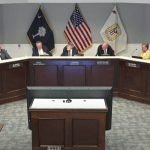SC Senate Considers Hands-Free Driving and Increased Penalties for Evading Law Enforcement

The South Carolina Senate is nearing final votes on two separate pieces of legislation aimed at enhancing road safety in the state. Both bills, having previously passed the House, could soon reach the Governor’s desk.
One bill under consideration would establish a statewide hands-free driving law, aligning South Carolina with approximately 30 other states that have similar measures in place. This legislation would prohibit drivers from physically holding or supporting a cellphone or other electronic device while operating a vehicle. This restriction would include holding the device to the ear, typing, scrolling, or having it resting on the driver’s lap. The bill would also apply to other electronic devices such as gaming consoles and would prohibit drivers from watching videos or participating in video calls while driving. Hands-free calls and voice-to-text functionalities would still be permitted. Supporters of the bill emphasized the potential loss of $54 million in federal highway funds, effective July 1, 2025, if this version of the legislation is not enacted. If passed in its current form, the hands-free law would take effect on September 1st, with a 180-day warning period preceding the issuance of tickets.
The second bill being considered by senators focuses on increasing the penalties for drivers who fail to stop when signaled to do so by law enforcement. Proponents of this legislation highlighted incidents across the state where individuals evading law enforcement receive lenient penalties, leading to repeated offenses and endangering the public. The bill proposes classifying a first offense of failing to stop for blue lights as a misdemeanor punishable by up to three years in prison. Subsequent offenses would be classified as felonies carrying a potential sentence of up to 10 years. Additionally, a first offense involving a high-speed pursuit would be a felony with a prison term of one to five years. An initial proposal to make all first offenses felonies was amended following concerns that it could unfairly penalize drivers who require additional time to find a safe location to pull over.
Both bills are expected to undergo final passage votes in the Senate on Thursday before being sent back to the House of Representatives. House members will then have the option to either concur with the Senate’s changes, sending the bills directly to the Governor, or attempt to reach a compromise before the legislative session concludes on May 8th.




